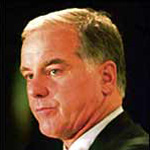 Instant-runoff voting is gaining momentum as problem solver
Instant-runoff voting is gaining momentum as problem solverBy Ross Sneyd
Published March 4th 2006 in Associated Press
BURLINGTON, Vt. - Runoff elections are typically cumbersome processes,
taking weeks and sometimes months to determine a winner. Burlington is
going to do it all instantly.
In an innovation known as instant runoff voting, the results of Tuesday's five-candidate election for mayor and whatever runoffs are needed to settle it will all be known soon after polls close.
For the first time in a mayoral election in the United States, voters will mark their ballots for their favorite candidate, along with their second, third, fourth and fifth choices.
If none of the five gets 50 percent of the vote on the first round, the candidate with the lowest vote total would be eliminated. Then the second choice of the voters who made that candidate their initial pick would be counted, and so on.
"As soon as somebody gets to 50 percent, it stops," said Jo LaMarche, the city's election director.
The winner will succeed incumbent Mayor Peter Clavelle, who announced last year he would not seek an eighth two-year term in the city of nearly 40,000 people.
Advocates promote instant runoff voting, also known as ranked-choice voting, as a way of boosting voter turnout and encouraging more people to run for public office by eliminating concerns that a third-party candidate might be a spoiler.
"Nationally, people are catching on to how IRV can open up our politics," said Ryan O'Donnell, communications director of FairVote, the Center for Voting and Democracy. "It's a reform that produces majority winners, encourages candidates to reach out to more voters, and eliminates the 'spoiler' problem."
If Florida had used instant runoff voting, the outcome of the 2000 presidential election likely would have been different, said Doug Amy, professor of politics at Mount Holyoke College and author of "Behind the Ballot Box: A Citizen's Guide to Voting Systems." Votes that went to Ralph Nader might ultimately have gone to Vice President Al Gore.
"I think that really brought that problem to national attention," Amy said.
San Francisco has elected members of its board of supervisors using instant runoff, but Burlington will be the first community in the nation to elect its chief executive officer with the system.
A number of other counties, cities, and towns have shown interest, according to FairVote, including San Diego, Oakland, Davis and Berkeley in California. LaMarche said she has gotten calls about the system from cities in South Carolina and Alaska.
"A lot of people are just waiting to see how this works with Burlington," LaMarche said.
Bills are pending in at least 15 states to implement instant runoffs at local levels or statewide. The state of Washington last year gave a number of mid-sized cities authority to conduct instant runoff voting, although none has so far used it.
Not everyone is enthusiastic about the idea. Some election administrators worry that fewer people will show up at the polls because of the system's complexity. There is also concern about incomplete counting in later runoff rounds.
Doug Lewis, director of the Election Center, which represents elections administrators nationally, said those all are concerns he and his colleagues have heard about instant runoffs. But he can't say whether they're valid.
"Until you work with it enough and find out it would be difficult to find out," he said
LaMarche believes Burlington voters will not see much that's unusual Tuesday. The only difference is the extra places after each mayoral candidate's name on the optically scanned ballots for second, third, fourth and fifth choices.
The Burlington city clerk's office conducted voter training in January to try to get voters interested and educated. There also have been mailings explaining how the system works.
Candidates even have tried to take advantage of the new system. Progressive Party candidate Bob Kiss' signs promote him as the "first choice for mayor." Republican Kevin Curley has told his supporters that he endorses Kiss as a second choice. Democrat Hinda Miller has declined to endorse a second choice, arguing she's confident she'll win in the first round.
ON THE NET
Burlington: http://www.ci.burlington.vt.us/
FairVote: http://www.fairvote.org/
In an innovation known as instant runoff voting, the results of Tuesday's five-candidate election for mayor and whatever runoffs are needed to settle it will all be known soon after polls close.
For the first time in a mayoral election in the United States, voters will mark their ballots for their favorite candidate, along with their second, third, fourth and fifth choices.
If none of the five gets 50 percent of the vote on the first round, the candidate with the lowest vote total would be eliminated. Then the second choice of the voters who made that candidate their initial pick would be counted, and so on.
"As soon as somebody gets to 50 percent, it stops," said Jo LaMarche, the city's election director.
The winner will succeed incumbent Mayor Peter Clavelle, who announced last year he would not seek an eighth two-year term in the city of nearly 40,000 people.
Advocates promote instant runoff voting, also known as ranked-choice voting, as a way of boosting voter turnout and encouraging more people to run for public office by eliminating concerns that a third-party candidate might be a spoiler.
"Nationally, people are catching on to how IRV can open up our politics," said Ryan O'Donnell, communications director of FairVote, the Center for Voting and Democracy. "It's a reform that produces majority winners, encourages candidates to reach out to more voters, and eliminates the 'spoiler' problem."
If Florida had used instant runoff voting, the outcome of the 2000 presidential election likely would have been different, said Doug Amy, professor of politics at Mount Holyoke College and author of "Behind the Ballot Box: A Citizen's Guide to Voting Systems." Votes that went to Ralph Nader might ultimately have gone to Vice President Al Gore.
"I think that really brought that problem to national attention," Amy said.
San Francisco has elected members of its board of supervisors using instant runoff, but Burlington will be the first community in the nation to elect its chief executive officer with the system.
A number of other counties, cities, and towns have shown interest, according to FairVote, including San Diego, Oakland, Davis and Berkeley in California. LaMarche said she has gotten calls about the system from cities in South Carolina and Alaska.
"A lot of people are just waiting to see how this works with Burlington," LaMarche said.
Bills are pending in at least 15 states to implement instant runoffs at local levels or statewide. The state of Washington last year gave a number of mid-sized cities authority to conduct instant runoff voting, although none has so far used it.
Not everyone is enthusiastic about the idea. Some election administrators worry that fewer people will show up at the polls because of the system's complexity. There is also concern about incomplete counting in later runoff rounds.
Doug Lewis, director of the Election Center, which represents elections administrators nationally, said those all are concerns he and his colleagues have heard about instant runoffs. But he can't say whether they're valid.
"Until you work with it enough and find out it would be difficult to find out," he said
LaMarche believes Burlington voters will not see much that's unusual Tuesday. The only difference is the extra places after each mayoral candidate's name on the optically scanned ballots for second, third, fourth and fifth choices.
The Burlington city clerk's office conducted voter training in January to try to get voters interested and educated. There also have been mailings explaining how the system works.
Candidates even have tried to take advantage of the new system. Progressive Party candidate Bob Kiss' signs promote him as the "first choice for mayor." Republican Kevin Curley has told his supporters that he endorses Kiss as a second choice. Democrat Hinda Miller has declined to endorse a second choice, arguing she's confident she'll win in the first round.
ON THE NET
Burlington: http://www.ci.burlington.vt.us/
FairVote: http://www.fairvote.org/
 On March 16th, Former Vermont Governor and Democratic National Committee Chair Howard Dean continued his support for instant runoff voting on Vermont Radio's Mark Johnson Show. Commenting on Burlington's recent IRV election, Dean said "I think the best and most democratic way to use to elect people in multiparty elections is instant runoff voting." Dean also supported the system when it was first used in Burlington in 2006.
On March 16th, Former Vermont Governor and Democratic National Committee Chair Howard Dean continued his support for instant runoff voting on Vermont Radio's Mark Johnson Show. Commenting on Burlington's recent IRV election, Dean said "I think the best and most democratic way to use to elect people in multiparty elections is instant runoff voting." Dean also supported the system when it was first used in Burlington in 2006. Citizens of Burlington, Vermont went to the polls on Tuesday, March 3rd to vote for the second time in an election using instant runoff voting. At 8:25 PM, the city declared that incumbent Mayor Bob Kiss had won reelection in the third and final round of counting, narrowly edging out challenger Kurt Wright, 51.5% to 48.5%. The race was unique in that it had four candidates that had a legitimate shot at winning: Progressive Kiss, Republican Wright, Democrat Andy Montroll, and independent Dan Smith. In most other American cities, there would be fear of "spoiler" candidates, but IRV allowed all four candidates to run without having to worry about being labeled "spoilers."
Citizens of Burlington, Vermont went to the polls on Tuesday, March 3rd to vote for the second time in an election using instant runoff voting. At 8:25 PM, the city declared that incumbent Mayor Bob Kiss had won reelection in the third and final round of counting, narrowly edging out challenger Kurt Wright, 51.5% to 48.5%. The race was unique in that it had four candidates that had a legitimate shot at winning: Progressive Kiss, Republican Wright, Democrat Andy Montroll, and independent Dan Smith. In most other American cities, there would be fear of "spoiler" candidates, but IRV allowed all four candidates to run without having to worry about being labeled "spoilers." On April 4, Vermont governor Jim Douglas chose to veto legislation to re-establish majority elections for Congress in his state through instant runoff voting. Vermont would have been the first state to enact IRV for Congress; legislative leaders affirmed their commitment to the bill, and it is sure to move in the state again. FairVote has worked hard to support this legislation, which likely generated more than 600 phone calls to the governor from Vermonters.
On April 4, Vermont governor Jim Douglas chose to veto legislation to re-establish majority elections for Congress in his state through instant runoff voting. Vermont would have been the first state to enact IRV for Congress; legislative leaders affirmed their commitment to the bill, and it is sure to move in the state again. FairVote has worked hard to support this legislation, which likely generated more than 600 phone calls to the governor from Vermonters.